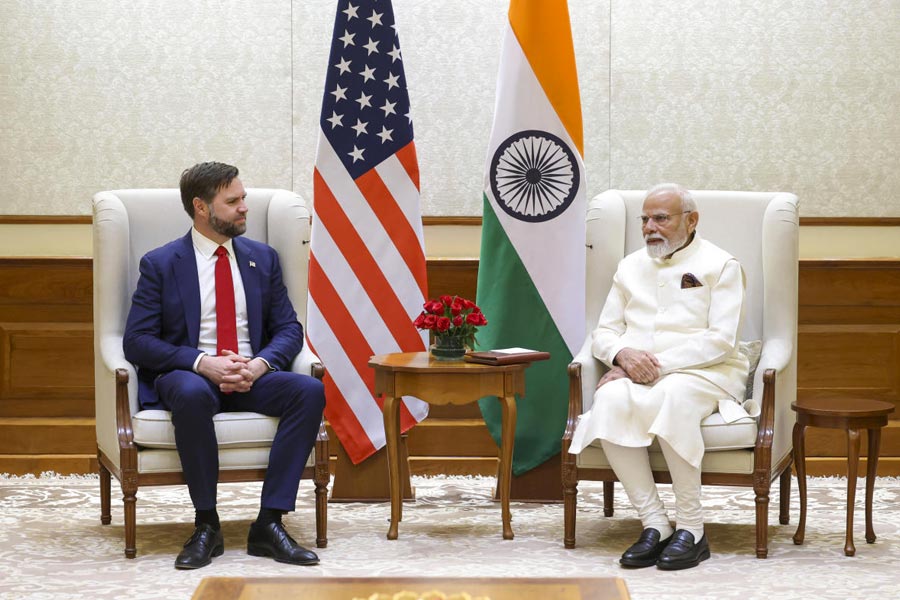It may seem friendly on the surface, but India and the United States appear to have big hurdles to overcome before they can seal a trade deal.
US Vice President J.D. Vance has ripped into India for what he calls years of unfair trade practices even as he said New Delhi could be among the first to clinch a new tariff agreement with Washington.
“The Indians — let’s be honest — they’ve taken advantage of us for a very long time,” Vance told Fox News, adding, “But we’re going to rebalance that relationship.”
India is scrambling to avoid steep 26 per cent import tariffs threatened by President Donald Trump as part of his global tariff blitz, with the government facing heavy US pressure for big concessions in key sectors — from agriculture and pharma to tech.
But while officials on both sides have talked up progress, the final deal may be far from imminent. The US also feels it faces non-tariff barriers to the Indian market.
Vance, who met with Prime Minister Narendra Modi in New Delhi for talks on trade, took particular aim at India’s agricultural import rules, saying the country’s market remained effectively “closed off” to US farmers. “Our farmers are making great things, but the Indian market is shut.”
The US Trade Representative’s latest report flagged a string of Indian policies — what it described as opaque rules on dairy, pork, and fish; bans on genetically modified products; weak intellectual property enforcement; and import curbs on products ranging from boric acid to pulses.
Last week, India and the US launched talks on a bilateral trade agreement aimed at boosting annual trade from $190 billion to $500 billion by 2030. The first round of in-person negotiations kicked off in Washington on April 23, led by India’s chief negotiator Rajesh Agrawal.
Vance suggested India “could be one of the first” deals to be struck under Trump’s second-term push. “We’ve got negotiations with Japan, Korea, folks in Europe — and a good negotiation going on in India,” he said.
But both sides are playing hardball.
The US wants India to slash what it views as unfair restrictions on dairy, pork, poultry, and genetically modified crop imports. American negotiators argue India has locked out high-quality US farm exports.
But India sees risks. Cheaper, mass-produced US farm goods could swamp local markets and undercut millions of small landholders. Religious concerns also loom large: US dairy cattle are often fed blood or bone meal.
Even in the past, when tariffs weren’t in play, this issue has blocked US dairy access to India.
There are also fears that reliance on imported staples or genetically modified crops could undermine India’s long-term agricultural resilience. Also protecting the powerful dairy sector led by Gujarat-based dairy giant Amul could be a red line for the government.
Both Modi and home minister Amit Shah are determined to protect Amul which is a powerful force in their home state.
Washington is also pressing for tougher intellectual property laws, especially in pharmaceuticals. But tighter intellectual property rules could delay affordable generics and raise healthcare costs for millions — a politically explosive issue. Indian firms also warn that blocking generic competition could decimate their booming generics exports.
The US wants faster drug approvals, stricter patent regimes, and freer pricing for medical devices like stents and implants. But India’s looser patent laws and price caps were created to keep life-saving treatments within reach of low-income patients.
On tech, the US is targeting India’s data localisation rules and digital taxes. Tech giants like Amazon and Google want open cross-border data flows and fewer compliance hurdles. But India insists on its right to regulate how foreign firms handle domestic user data, citing privacy, security, and the need to give local startups space to grow.
Amazon and Wal-Mart are reportedly also pushing to be allowed to sell products directly as they do abroad which gives them higher profit margins.
Here in this country, as part of a government effort to protect local shopkeepers from being crushed by retail giants, Amazon and Wal-Mart must act as marketplaces, or middlemen, helping local sellers -- small businesses and brands -- sell their goods. Amazon and Wal-Mart only earn a commission on these sales, limiting their profits.
US firms are also pushing for access to Indian public tenders, arguing that “local preference” policies are freezing them out of the procurement process. But India argues such rules are key to supporting domestic firms and strategic sectors.
For India, the risks of giving away too much are high. Any perception that New Delhi has been arm-twisted — especially on sensitive sectors like agriculture, pharma, or tech — could bring fierce political blowback.
While Vance hailed Modi as a “tough negotiator,” his words may be little more than diplomatic flattery. In reality, the path to a deal is likely to be slow and politically fraught.











